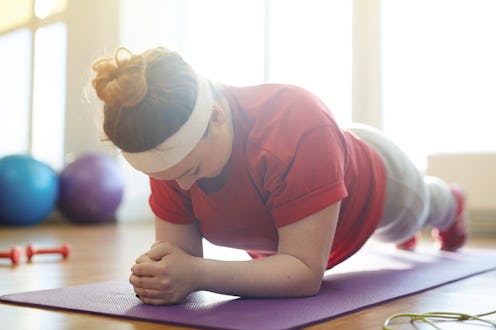Life
Science Says This Kind Of Workout Can Help With Chronic Pain, Mental Health & Your Sleep

For years, celebrities, and probably at least one person in your friend group, have been touting the health benefits of pilates. It’s a popular workout that’s challenging, while simultaneously feeling more approachable than other exercise routines with cult-like followings. Science has long been fascinated with the links between various forms of exercise and long-term effects on devotees. A new study shows that, for a pilot group of people with chronic conditions, committing to a 12-week pilates regimen enabled participants to function better and manage their condition more effectively, as well as identifying psychological and social benefits.
The study, published in the journal Musculoskeletal Care, was one of the first to look at how pilates could affect the lives of people with chronic conditions. Some of the conditions people in the pilot study had included: Nonspecific low back pain, peripheral joint osteoarthritis, and a range of postsurgical conditions. Participants’ ages ranged from 36 to 83, and beyond physical improvements, the study revealed benefits like more active lifestyles and helping the participants to manage their conditions.
"Improving function in meaningful daily activities produced psychological and social benefits that increased motivation to adhere to the programme [sic]and promote a healthier lifestyle," said co-author Lynne Gaskell in a statement.
These results shouldn’t be seen as definitive by any means, though — one of the study’s major caveats is that it only had a sample size of 22, which is small by any scientific standards. But there’s a sizable body of research that supports the potential mental health benefits, on top of physical ones, of adding pilates to your exercise routine.
One 2009 study found that a semester of pilates training on college-age individuals correlated with improvements on perceived self-efficacy and sleep quality, as well as significant improvements on mood. A following study by the same group of researchers, this time focused on whether mindfulness increased through participation in pilates, was published in 2013. Total mindfulness scores increased overall for the group of participants enrolled into a 15-week long pilates exercise group, who were measured during the beginning, middle, and end of the semester for mindfulness, perceived self-efficacy, mood, stress, and sleep quality. Mindfulness scores notably didn’t increase in the other exercise control group, suggesting that practicing pilates could be associated with increases in mindfulness that may account for changes in mood and perceived stress.
The research seems promising, considering that one of the unique aspects about pilates is its emphasis on mental work alongside physicality. Centering, aka, the understanding that all movements originate in one’s core, is a key component of the exercise. “Like yoga, it’s about breathing and focus and being mindful of your body’s movements,” Ann Gibson, an associate professor of exercise science at the University of New Mexico, told TIME.
The practice has also been linked to assisting different populations ranging from the elderly to new mothers. For moms dealing with postpartum fatigue, one study found that women who performed the exercise five times a week for eight consecutive weeks exhibited lower scores of general fatigue and mental fatigue, among other forms of tiredness, relative to the study's control group. And earlier this year, another study revealed significant improvements on the life satisfaction scores for elderly women after 16 weeks of pilates exercise intervention, suggesting that the practice could have benefits for healthy aging. Some researchers believe that pilates could be linked to reducing symptoms of anxiety, depression, and fatigue in practitioners, though more experimental studies are needed in the field.
With trendy new fitness studios popping up what feels like every week, pilates is more accessible than ever. Considering the potential mental and physical benefits of the practice, if you're on the fence about taking a class, now seems like as good a time as ever to try the exercise out for yourself.